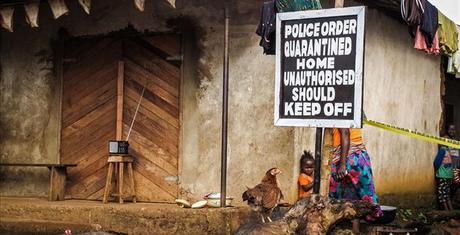U.N.: At Least 50 Ebola Hotspots Remain, but New Cases Falling
إقرأ هذا الخبر بالعربية
At least 50 Ebola hotspots remain in the three hardest-hit West African countries but new cases are declining and the deadly disease will be defeated, the U.N.'s Ebola chief said Thursday.
The latest report from the World Health Organization showing reductions in Guinea, Liberia and Sierra Leone "is very good news," Dr. David Nabarro said in an interview with The Associated Press.
In the week ending Jan. 11, WHO said Guinea reported its lowest weekly total of new Ebola cases since mid-August. Liberia had its lowest total since the first week of June and no confirmed new cases for the final two days of the week. And new cases in Sierra Leone declined for a second week to the lowest level since the end of August.
But Nabarro cautioned that "there are still numbers of new cases that are alarming, and there are hotspots that are emerging in new places that make me believe there is still quite a lot of the disease that we're not seeing."
There are "at least 50 micro-outbreaks" underway, and the chains of transmission of the virus "have still got to be understood," he said.
The Ebola outbreak has been the worst in world history. According to the latest WHO report released Wednesday, there have been more than 21,000 cases and 8,300 deaths. The death toll in Liberia as of Sunday was 3,538, followed by Sierra Leone with 3,062 deaths and Guinea with 1,814.
The key, Nabarro said, is getting local communities to change their traditional healing rituals and funeral and burial practices which involve a lot of contact with body fluids that spread Ebola.
In some cases, evidence suggests that as many as 50 people have become infected at a single funeral, he said.
Nabarro said the national and international campaign for safe healing and burial practices, isolation of suspected cases, and quick treatment for Ebola victims is working. But he appealed for greater global support including "virus detectives" who can identify where there are cases, "anthropologists who can tell us how the communities are reacting," and managers to make sure treatment centers are adequately equipped.
"We saw a big shift in behaviors in Liberia in November and December," he said. "We're now seeing a big shift of behaviors in much of Sierra Leone, though there are still one or two communities that are reluctant to change behavior. And we're beginning to see a big shift in behaviors in Guinea as well."
However, the goal of isolating and treating 100 percent of patients and conducting 100 percent of burials safely by Jan. 1 was missed. That's "a sign of the task still to be done," Nabarro said.
"Of course, 100 percent of safe burials and 100 percent of everybody quickly under treatment are still the directions that we're aiming at," Nabarro said. "And I do really anticipate that in much of the region, we will be there in a very short distance in the future, and that's why the number of cases is coming down and will continue to come down, and we will before long see an end to this outbreak."
Sierra Leone's President Ernest Bai Koroma predicted this week that his country would be Ebola-free by WHO standards by May, which means zero new cases for a period of time.
Nabarro said Koroma's judgment "is based on the way the local communities are embracing the response."
"I personally would respect his judgment and his prediction," said Nabarro, who just returned from a 10-day visit to West Africa including all three hard-hit countries. "I'm very wary myself to make predictions because I just don't have the information."



